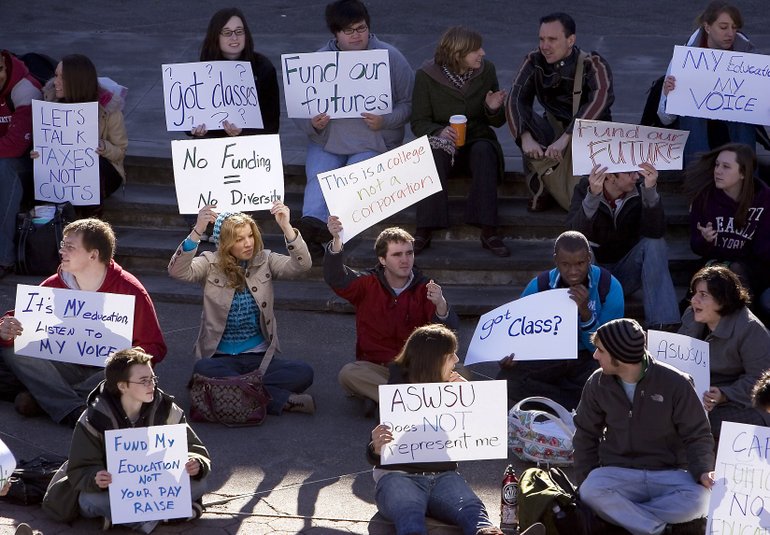Tuition-setting authority has been a hot issue during the current legislative session, with many opinions expressed, including that of The Columbian (“In Our View: Tuition Decisions”, Feb. 24, 2010).
State Rep. Deb Wallace, chair of the House Committee on Higher Education, was correct in not forcing Senate Bill 6562 out of committee for further consideration this year. It provides no solutions for our current budget crisis and does nothing more than further the trend of disinvestment and privatization of our public universities. Her observation about retaining accountability in the Legislature is absolutely correct until a comprehensive review is made of the spending habits at public colleges and universities and the public is assured that improved access, predictability, accountability and quality will result from additional local control.
SB 6562 would have delegated tuition-setting authority from the Legislature to the boards of regents at the University of Washington and Washington State University and to the board of trustees at Western Washington University. Meanwhile, tuition-setting authority would have remained with the Legislature for Eastern Washington University, Central Washington University, the Evergreen State College, and all community and technical colleges.
The Columbian editorial in support of SB 6562 makes assumptions and mistakes that undermine the arguments and actually highlight the flaws in the Senate’s proposal for local tuition-setting control (including tuition rates for WSU Vancouver). First, comparisons with the 75th percentile of “similar public institutions” are irrelevant. Tuition would have to increase at rates far beyond the two other caps included in the bill to reach this level. While Washington tuition may be lower than these so-called East Coast peers, UW is already at the 75th percentile for the total cost of attendance, which includes things like the cost of living.
Second, the quote from The News Tribune in Tacoma about $95,000 household incomes being eligible for financial aid is years away and only after tuition reaches a certain percentage of family income. For a $95,000 family to receive aid under SB 6562, tuition would need to increase by about $6,000 and the family would only receive a $3,000 return in aid. This proposal hardly promotes affordability or predictability and does not bind future legislators from breaking this promise.
Third, the editorial suggests that parents of young children who buy Guaranteed Education Tuition credits would be able to better plan and save now. On the contrary, the state actuary says that the “investor class” will benefit while the average family will lose purchasing power with such a steep trajectory for GET credit increases.
Vital role
Who sets tuition is important for three reasons. First, keeping tuition as low as possible is good public policy; low tuition is the best form of financial aid. It signals to students with low or modest incomes that higher education is within their reach and it helps support the public benefit of an educated citizenry.
Second, the level of tuition is just one leg of a three-leg stool, the others being state funding and financial aid. If tuition is disconnected from the other two legs, student debt capacity becomes the stabilizer. As the state’s share has decreased, tuition has increased and financial aid has struggled to keep up. As a result, debt has increased to an average level of $7,000 per year for undergraduate borrowers. Legislative control maintains a healthy tension between the three aspects of college funding. With local control, tuition increases could easily outpace funding for financial aid.
Third, students and their families will have little, if any, ability to influence the tuition-setting process if it is delegated to an appointed board that conducts most of its deliberative work behind closed doors. Trustees and regents meet in public about once a month, with very limited agenda time for public comments. The issues upon which they vote are hashed out ahead of time, in a series of document exchanges, e-mails, and phone calls, few of which are available for public inspection, leading to formal votes that are usually unanimous.
Peter Sterr is a student at Washington State University Vancouver and director of legislative affairs for the Washington Student Association.



